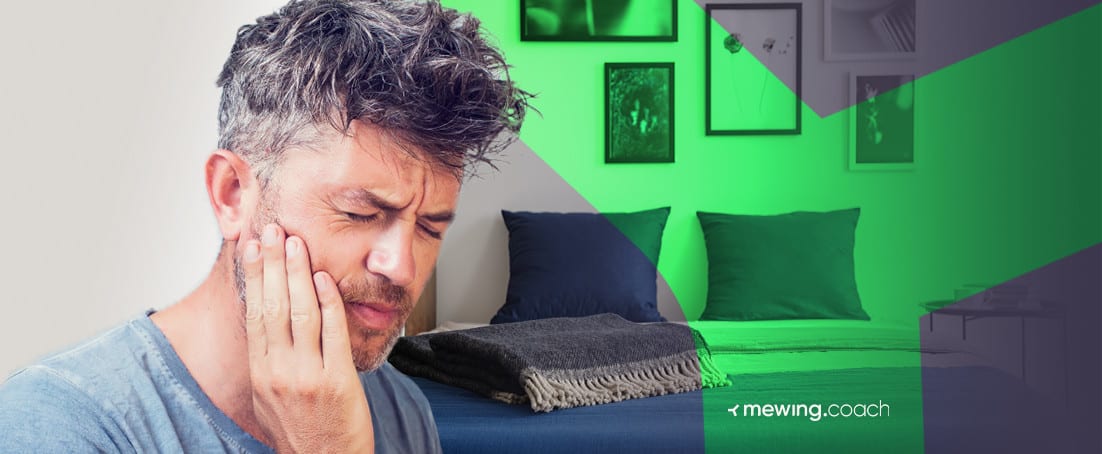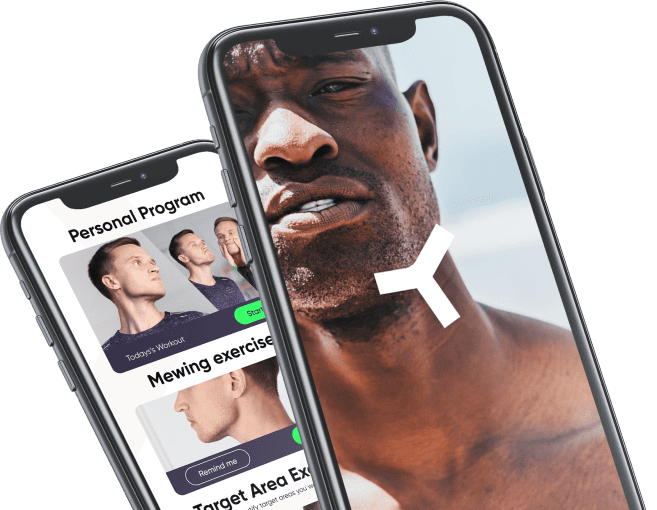
Waking up with jaw pain can completely break your day. Jaw pain is unlike any other pain a human can feel due to the intensity. However, morning jaw pain is the usual one gone ten times wrong.
The jaw may hurt in the morning due to many reasons. It can be caused by an array of issues, from sleep apnea to chronic teeth clenching, leaving you with a sore jaw. Although it may seem difficult now, severe jaw pain is treatable in several ways.
Treat stress-related teeth grinding by avoiding stress, but what about tooth sensitivity? To help you treat jaw pain, this article will elaborate on the following:
- 🤔 What is jaw pain?
- 🩺 What causes jaw pain and how to treat it?
- 🙌 How mewing can help reduce the pain!
Plus, we will give you some amazing tips and tricks on how to treat it both naturally and cosmetically! But first, what exactly is morning jaw pain?
Morning Jaw Pain Explanation
If you’re one of the many thousands of people who start the day wondering ‘why does my jaw hurt when I wake up’, it is most likely related to occurrences during the night. Morning jaw pain is recognizable by the intense pain in your jaw right after you wake up, which is persistent in the morning but decreases during the day.
The most common culprits for jaw pain are chronic teeth grinding, gum disease, sinus inflammation, TMJ disorder, cavities, sleep apnea, snoring, or wisdom teeth. We’ll delve deeper into the root causes of each problem in the following section.
Why Does My Jaw Hurt When I Wake Up?
Dealing with a sore jaw in the morning doesn’t necessarily mean you have a Temporomandibular joint (TMJ) disorder. Often dealing with stress or bad oral habits can cause jaw discomfort. Let’s look at the most common culprits of a sore jaw.
Bruxism (teeth grinding and teeth clenching)
Bruxism is caused by grinding your teeth while sleeping and clenching your teeth which strains the jaw muscles. Bruxism can also happen during the day if you are constantly under pressure, drink a lot of caffeinated beverages, or are nervous. Nocturnal bruxism occurs during the night, and it’s considered a sleep disturbance.
Muscle Inflammation
Jaw muscles get super-strained if your job requires a lot of talking, like a talk show host. Continuous opening and closing of the mouth irritate the temporomandibular joints. There are natural ways to treat jaw muscle inflammation by practicing exercises to help you with jaw pain.
Arthritis
Arthritis is one of the most severe jaw diseases causing tissue destruction around the jaw joints. Besides osteoarthritis, there’s also rheumatoid and psoriatic arthritis. The negative thing is that osteoarthritis can occupy both sides of your jaw, evident from the severe jaw pain in the morning.
Untreated rheumatoid arthritis can result in an uneven jaw because it’s a long-term condition.
Malocclusion
Malocclusion is among the few dental problems that can cause jaw and tooth pain. This misalignment of the lower jaw and upper teeth is evident when the mouth is closed. It can cause an open bite (when the upper and bottom teeth don’t align), gum disease, gingival smile, and jaw pain upon waking.
Blunt-force trauma can sometimes be the cause of malocclusion. Having received a hit in your jaw, you might experience joint pain, requiring a professional dental examination.
Stress
Extreme stress can be the main culprit of many of these jaw problems. Stress and caffeine usually cause teeth grinding and clenching, but unconscious teeth clenching happens when you are nervous. Stress can cause sleep apnea and other disturbances leading to jaw pain in waking hours.
Sleep Disturbances
A few sleep disturbances can cause waking with jaw pain every morning. One reason for morning jaw pain is snoring. When snoring, we sleep with our mouth wide open. This strains the jaw joints, causing them to hurt tremendously in the morning.
Those with sleep apnea have a greater chance of developing a TMJ disorder. This is because their sleep patterns are obstructed, and the airways are blocked, so they sleep with an open mouth. With the lower jaw being constantly open, it can strain the two temporomandibular joints leading to severe pain.
Symptoms of The Morning Jaw Pain
The number one symptom is morning jaw pain that occurs daily. Here are other key symptoms to consider.
Pain in the jaw joint or surrounding muscles upon waking up
You may suffer from morning jaw pain if you notice a sharp pain in your jaw joints. This pain lasts all morning but can dull away in the afternoon and night. The pain does not occupy only the jaw joints but also the surrounding muscles of the cheeks.
Difficulty opening or closing the mouth in the morning
Morning jaw pain is possible if you have difficulty getting a sip of your coffee. The most annoying symptom of morning jaw pain is the inability to open or close your mouth painlessly. The pain can impair how you speak, eat, drink, etc.
Headaches and/or ear pain in the morning
You may be experiencing TMJ disorder symptoms if you suffer from a headache, ear pain, and jaw pain. Once the jaw pain spreads to the ears, it can easily affect the neck muscles.
Other symptoms
In addition to morning jaw pain, some individuals may also experience discomfort associated with other facial or neck issues, such as horizontal neck lines. These lines, often caused by posture or muscle tension, can contribute to overall discomfort and may benefit from similar treatment approaches.
How to Diagnose Why Your Jaw Hurts in The Morning?
Seek professional help if the morning jaw pain lingers or is persistent on one side. There are several ways to detect problems with your jaw.
Dental Examination
A dentist is the perfect medical professional to help you with an aching jaw because they can determine the source of the pain. They can help determine if the cause of your jaw aches is gum disease, tooth problems, cavities, etc. They might recommend tooth filling, crowns, or extracting teeth beyond saving.
Physical Examination
A doctor performing a physical exam can inspect your jawline angle. If your jawline is dropping, then there might be a problem. They can also measure and compare the facial features to the standard ones.
A physical examination is performed on those with an pronounced jaw pain problem or an uneven or prominent jaw. If your jawline has a deformity, they will give you further advice on improving the shape of your jaw with corrective surgery.
X-rays or Other Imaging Tests
An X-ray can best show the root cause of your jaw discomfort. Your dentist will perform an X-ray to examine your teeth and jaw and determine everything is correct and aligned. They might also do a CT scan to take a closer look and create images of the bones involved in the joints. Finally, a dentist might perform an MRI to reveal problems with the joint’s disk or soft tissue.
Ways to Treat the Painful Jaw in the Morning
Improving jaw mobility is the key way to reduce pain in the mornings. However, besides controlling how you move your jaw joints, there are other ways to treat it.
Night Guards and Bite Splints
Think of night guards as protective helmets for teeth. They are worn at night to prevent teeth grinding and move your teeth and jaw into the proper position. Night guards also alleviate jaw tension, pain, and even headaches. A night guard covers the biting surfaces of the teeth to stop them from clenching during the night.
Bite splints, called occlusal adjustments, are transparent, braces-like appliances that protect your teeth, jaw, and muscles from overusing them. Designed for the upper teeth to treat TMJ symptoms, you can also wear bite splints at night.
Medications
A medical professional may prescribe pain relievers if the jaw pain is too severe. Other medications that you can take for sore jaw are muscle relaxants. Take them before sleep to relax the muscles after a tiring day and keep the jaw from clenching during sleep.
Physical Therapy
Physical therapy is helpful not only in reducing jaw pain but neck pain as well. A certified TMD physical therapist will examine you to determine the cause of your pain. They will also help improve the way your jaw moves. Physical therapy involves non-invasive treatment that will decrease the pain and restore the natural movement of your jaw.
Relaxation Techniques
Sometimes, excessive stress causes pain, so the best way to reduce it is to relax. Give yourself a break and try yoga before sleep. It will help relax the body and clear the mind. You can also try therapy to help with stress management or meditation before bed.
Sleep hygiene
Grinding your teeth at night may mean you need to practice good sleep hygiene. This involves no screen time for at least an hour before bed, no caffeine or alcohol before sleep, and creating a sleepy, relaxed environment. It means setting up a completely dark room at the right temperature.
Preventing the Jaw Pain Before It Appears
Before getting a jaw pain diagnosis, do everything you can to prevent the issue. Here is how you can fix a weak-looking jawline before a problem appears.
Mewing
Keeping your teeth and tongue in a perfect posture can help improve jaw mobility and strength. If you practice natural, therapeutic techniques like slow breathing while placing your tongue against the roof of your mouth, you can relieve pain and add symmetry to your jaw. Pair that with proper teeth alignment, and you have a facial exercise that will change the shape of your face for good.
Are you wondering about the technique? We are talking about mewing! This nifty trick can have you feeling and looking your best in no time because it will sculpt your face like never before. If you don’t know how to mew, check out the complete mewing guide with examples available on the mewing.coach app!
If you feel jaw pain while mewing, you might have gone too far. Remember, hard mewing is the technique for the advanced and experienced. Download the mewing.coach app, create a personal plan, and make the first step to a better you! No surgery or trigger point injections are necessary!
Reducing Stress
Another way to prevent a sore jaw is to stop stressing. Try to feel relaxed more often by doing yoga or meditating every day. Make sure not to overthink negative things or take a vacation from work to settle the pain problem.
Avoiding hard or chewy foods before bed
Don’t chew gum or eat cereal or chips before bed. Constant repetitive motions like chewing can cause problems during nighttime, so avoid eating at least 3 hours before bed.
Practicing good oral hygiene
Never skipping out on brushing your teeth and flossing guarantees you won’t develop gum disease or cavities that can cause jaw pain.
Final Words
Jaw pain is one of the worst pains a body can feel, and if left untreated, it could lead to some devastating results. If you’ve been wondering why you’ve been waking up with sore jaw after sleep, then the tips in this article will help you! Just make sure you maintain good oral hygiene, get regular dental check-ups, and try natural and breathing exercises. Mewing is one of the best ways to keep your jawline in perfect shape, along with avoiding stress and maintaining a calm and healthy lifestyle!




